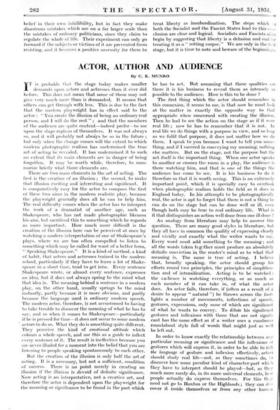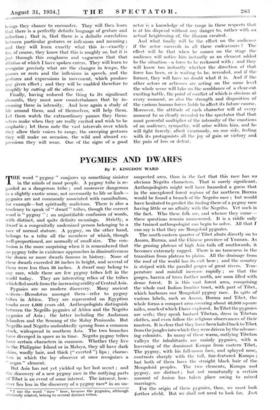ACTOR, AUTHOR AND AUDIENCE
By C. K. MUNRO
IT is probable that the stage today makes smaller demands upon actors and actresses than it ever did before. This does not mean that some of them may not give very much more than is demanded. It means that others can get through with less. This is due to the fact that the modern playwright has in effect said to the actor : " You create the illusion of being an ordinary real person, and I will do the rest " ; and that the members of the audience are quite content—indeed prefer—to see upon the stage replicas of themselves. It was not always so, and it will probably not alwiys be so in the future ; but only when the change conies will the extent to which modern photographic realism has undermined the true art of acting be revealed. It has undermined it to such an extent that its main elements are in danger of being forgotten. It may be worth while, therefore, to sum- marize briefly what those elements are.
There are two main elements in the art of acting. The first is the creation of an illusion ; the second, to make that illusion exciting and interesting and significant. It is comparatively easy for the actor to compass the first of these two aims in the modern realistic play, because the playwright generally does all he can to help him. The real difficulty conies when the actor has to interpret the work of a dramatist of another age, such as Shakespeare, who has not made photographic likeness his aim, but sacrificed this to something which he regards as more important. How much more difficult is the creation of the illusion here can be perceived at- once by watching a modern interpretation of one of Shakespeare's plays, where we are too often compelled to listen to something which may be called for want of a better term, " Speaking Shakespeare." It is a kind of method, a kind of habit, that actors and actresses trained in the modern school, particularly if they have to learn a lot of Shake- speare in a short time, tend to get into. Every sentence .Shakespeare wrote, or almost every sentence, expresses an idea, but it does not always spring to the mind what that idea is. The meaning behind a sentence in a modern play, on the other hand, usually springs to the mind instantly, partly because it is more obvious, and partly because the language used is ordinary modern speech. The modern actor, therefore, is not accustomed to having to take trouble to discover the meaning of what he has to say, and so when it comes to Shakespeare—particularly if he is pressed for time—it does not occur to some modern actors to do so. What they do is something quite different. They perceive the kind of emotional attitude which colours a whole speech, and use thik as a guide to inflect every sentence of it. The result is ineffective because you are never illuded for a moment into the belief that you are listening to people speaking spontaneously to each other.
But the creation of the illusion is only half the art of acting. It is a necessary, but not a sufficient, condition of success. There is no point merely in creating an illusion if the illusion is devoid of definite -significance. Now acting is an interpretative, not a creative art, and therefore the actor is dependent upon the playwright for the meaning or significance to he found in the part which he has to act. But assuming that these qualities are there it is his business to reveal them as intensely as possible to the audience. How is this to be done ?
The first thing which the actor should remember in this connexion, it seems to me; is that now he must look at the matter in exactly the opposite way to that appropriate when concerned with creating the illusion. Then he had to see the action on the stage as if it were real life ; now he has to remember that it is not. In real life we do things with a purpose in view, and so long as we fulfil that purpose, it does not matter how we do them. I speak to you because I want to tell you some- thing, and if I succeed in conveying my meaning, nothing else matters. But on the stage, not the purpose but the act itself is the important thing. When one actor speaks to another or crosses the room in a play, the audience is there watching him, and that is one of the things the audience has come to see. It is his business to do it therefore so that it is worth seeing. This is an extremely important point, which it is specially easy to overlook when photographic realism holds the field as it does in England today. In his attempts to be photographically real, the actor is apt to forget that there is not a thing he can do on the stage but can be done well or ill, even though both may be true to real ordinary life. What is it that distinguishes an action well done from one ill done ?
An analogy from literature may help to answer this question. There are many good styles in literature, but they all have in common the quality of expressing clearly and vividly and exactly what the writer wants to say. Every word must add something to the meaning ; and all the words taken tcrther must produce an absolutely definite conviction in the reader's mind as to what that meaning is. The same is true of. acting. I believe that, broadly speaking, the actor should group his efforts round two principles, the principles of simplifica- tion and of intensification. Acting is to be watched : the audience is watching everything, or as much as each member of it can take in, of what the actor does. An actor fails, therefore, if (often as a result of a desire to appear " natural ") he throws across the foot- lights a number of movements, inflections of speech, gestures, expressions, only some of which are significant of what he wants to convey. To dilute his significant gestures and inflexions with those that are not signifi- cant has the same effect as if a writer uses a cumbrous roundabout style full of words that might just as well be left out.
In order to know exactly the relationship between any particular meaning or significance and the inflexions or gestures which will express it, in order to be able to talk the language of gesture and -inflexion effectively, actors should study real life—not, as they sometimes do, to discover how some peculiar kind of character-part which they have to interpret should be played—but, as they much more rarely do, in its more universal elements, how people actually do express themselves. For this they need not go to Hoxton or the Highlands ; they can dis- cover it inside themselves or -from any other human beings they chance to encounter. They will then learn that there is a perfectly definite language of gesture and inflection ; that is, that there is a definite correlation between particular gestures or inflexions and meaning ; and they will learn exactly what this is—exactly ; for, of course, they know that this is roughly so, but it is just through this roughness and vagueness that that dilution of which I have spoken enters. They will learn to recognize precisely what are the changes in tempo, the pauses or rests and the inflexions in speech, and the gestures and expressions in movement, 'which produce any given effect ; and they will be enabled therefore to simplify by cutting all the others out.
Finally, having reduced the thing to its significant elements, they must now counterbalance that by in- creasing these in intensity. And here again a study of life around them, and of themselves, will help them. Let them watch the extraordinary pauses they them- selves make when they are really excited and wish to be emphatic ; let them note the vast intervals over which they allow their voices to range, the sweeping gestures they will make on occasion, the wild and absurd ex- pressions they will wear. One of the signs of a good actor is a knowledge of the range in these respects that is at his dispcsal without any danger to, rather with an actual heightening of, the illusion created.
And what finally will be the effect on the audience if the actor succeeds in all these endeavours ? The effect will be that when he comes on the stage the audience will notice him instantly as an element added to the situation—a force to be reckoned with ; and they will know too instantly whether the direction of that force has been, or is waiting to be, revealed, and if the former, they will have no doubt what it is. And if the other actors or actresses arc acting on the same level the whole scene will take on the semblanceof a clear-cut exciting battle, the point of conflict of which is obvious at every moment, as also the strength and disposition of the various human forces liable to affect its future course. Moreover, the attitude of each chairacter will at every moment be so clearly revealed to the spectator that that most powerful multiplier of the intensity of the emotions of an audience, sympathy, will arise within him, and he will fight fiercely, albeit vicariously, on one side, feeling with its protagonists all the joy of gain or victory and the pain of loss or defeat.







































 Previous page
Previous page